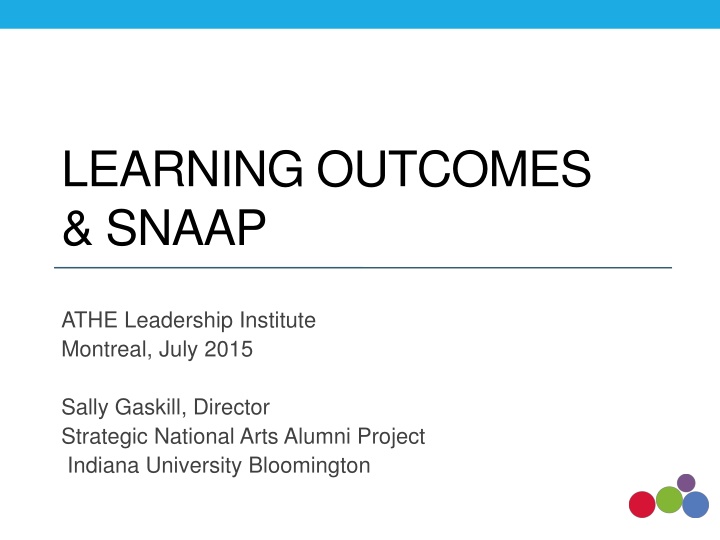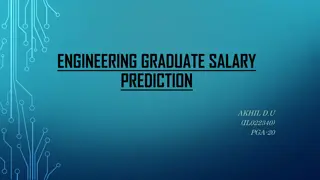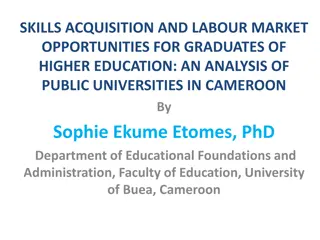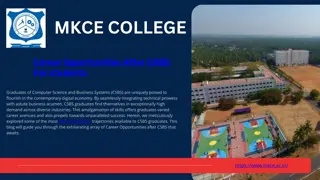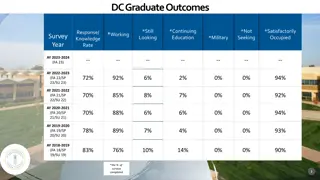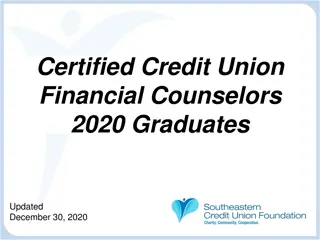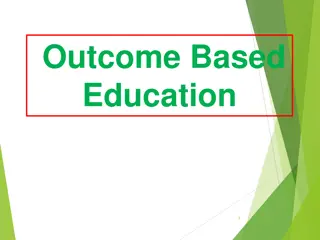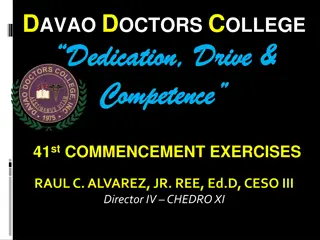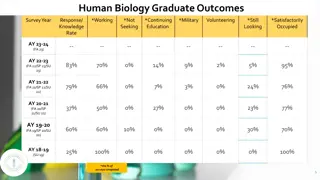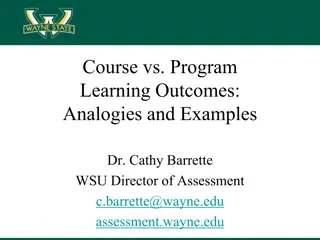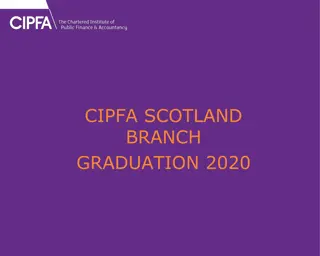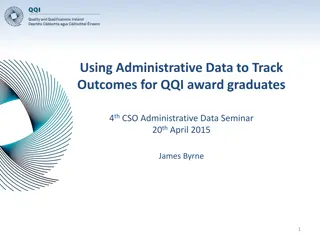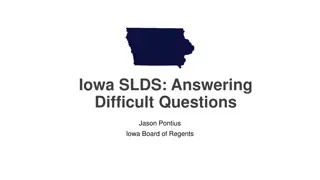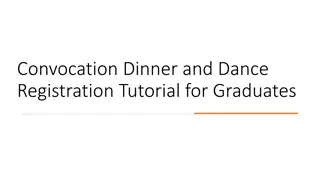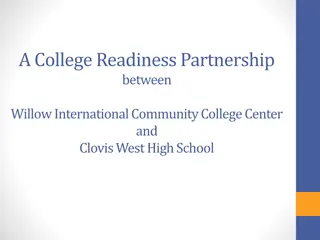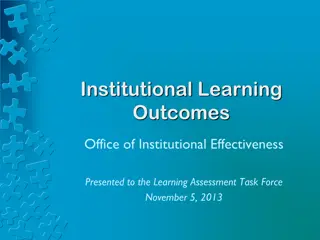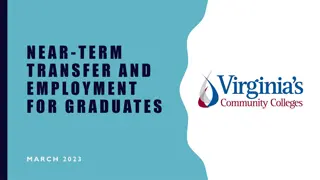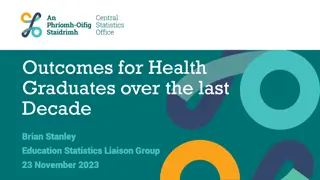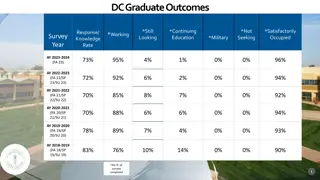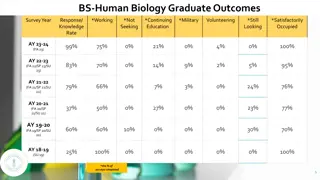Essential Learning Outcomes for College Graduates
Statement describing knowledge or skills students should acquire by the end of a course, focusing on AAC&U's promotion of essential learning outcomes across various disciplines, emphasizing intellectual, practical, personal, and social skills.
Download Presentation

Please find below an Image/Link to download the presentation.
The content on the website is provided AS IS for your information and personal use only. It may not be sold, licensed, or shared on other websites without obtaining consent from the author.If you encounter any issues during the download, it is possible that the publisher has removed the file from their server.
You are allowed to download the files provided on this website for personal or commercial use, subject to the condition that they are used lawfully. All files are the property of their respective owners.
The content on the website is provided AS IS for your information and personal use only. It may not be sold, licensed, or shared on other websites without obtaining consent from the author.
E N D
Presentation Transcript
LEARNING OUTCOMES & SNAAP ATHE Leadership Institute Montreal, July 2015 Sally Gaskill, Director Strategic National Arts Alumni Project Indiana University Bloomington
Whats a learning outcome? A statement that describes the knowledge or skills students should acquire by the end of a particular assignment, class, course, or program and helps students understand why that knowledge and those skills will be useful to them. -A Guide for University of Toronto Faculty And why are learning outcomes important?
Arts & Humanities Under Fire Using Census data: Georgetown Center on Education & the Workforce
AAC&U Association of American Colleges & Universities Founded 1915 1,300 member institutions (international) Campaign to promote essential learning outcomes for college graduates
AAC&U Essential Learning Outcomes (1) Knowledge of Human Cultures and the Physical and Natural World. through studies in science & math, social sciences, and arts & humanities focused by engagement with big questions, both contemporary and enduring
AAC&U Essential Learning Outcomes (2) Intellectual and Practical Skills, including: Creative thinking Critical thinking Inquiry and analysis Written and oral communication Teamwork and problem solving Quantitative and Information literacy Practiced extensively, across the curriculum, in the context of progressively more challenging problems, projects, and standards for performance
AAC&U Essential Learning Outcomes (3) Personal and Social Responsibility, including: Civic engagement local and global Intercultural knowledge and competence Ethical reasoning and action Foundations and skills for lifelong learning Global learning Anchored through active involvement with diverse communities and real-world challenges
AAC&U Essential Learning Outcomes (4) Integrative and Applied Learning Synthesis and advanced accomplishment across general and specialized studies Demonstrated through the application of knowledge, skills, and responsibilities to new settings and complex problems
What learning outcomes do you want your students to have in their toolkits when they graduate?
UG Theatre Alumni: Skills Learned at Arts School v Needed on the Job 100% 99% 99% 98% 97% 96% 96% 94% 94% 93% 92% 92% 91% 90% 88% 86% Interpersonal relations and working collaboratively Improved work based on feedback Broad knowledge & education Creative thinking/Problem solving Theater - School contributed to skill Theater - Important to work
UG Theatre Alumni: Skills Learned at Arts School v Needed on the Job 100% 95% 94% 89% 90% 83% 80% 79% 80% 70% 60% Theater - School contributed to skill 50% Theater - Important to work 40% 30% 20% 10% 0% Persuasive speaking Leadership skills Clear writing
UG Theatre Alumni: Skills Learned at Arts School v Needed on the Job 100% 96% 94% 90% 77% 80% 76% 68% 70% 59% 60% 50% Theater - School contributed to skill Theater - Important to work 40% 30% 20% 10% 0% Networking and relationship building Teaching skills Project management skills
UG Theater Alumni: Skills Learned at Arts School v Needed on the Job 100% 88% 90% 83% 80% 71% 70% 60% 60% 50% Theater - School contributed to skill Theater - Important to work 40% 31% 30% 25% 20% 10% 0% Financial and business management Entrepreneurial skills Technological skills
How can we help theatre majors apply what they learn to their careers?
In the arts We excel in teaching our students to be creative problem solvers. 94% of SNAAP Theatre majors (UG degree) said their institution helped them acquire or develop creativity very much or some But we fall short in teaching our students to be creative in looking at the options available to them after graduation.
Changing the culture (1) Emphasize the transferrable skills: Creative problem-solving, critical thinking, dealing with ambiguity, collaborations, deadlines, project management (2) Organize an event for new majors (3) Promote internships
(4) Get to know the career counseling staff (5) Broaden the focus of a capstone class (6) Bring back alumni and celebrate their stories
(7) Develop some incentives to help your students/alumni expand their experiences. For current students For recent alumni
(8) Become familiar with the data (part 1) The #1 quality valued in employees by the top 500 CEOs in a global IBM study: creativity
More evidence Consensus among employers is that innovation, critical thinking, and a broad skill set are important for taking on complex challenges in the workplace. --Hart Research
Whats important to college seniors? 92% of all college seniors say that a career that allows them to be creative is important -- 2012 Teagle Study on Double Majors
Nonlinear Career Paths 25% of 18-44 year olds held 15 or more jobs in their lifetimes (the average number is 11 jobs) One-third of U.S. workers say they expect to be working in a different job next year
The College Earnings Premium THE COLLEGE EARNINGS PREMIUM Source: Carnevale, Jayasundera, and Cheah (2013)
(8) Become familiar with data (part 2) DataBriefs, Reports, Presentations, SnaapShot www.snaap.indiana.edu
SNAAP data on overall satisfaction of arts alumni 76% would attend their institution again 90% say their overall experience in art school was either very good or excellent. 87% are satisfied with their current jobs 82% are satisfied with their ability to be creative in their work
SNAAP data on how long to first job Theater Majors (UG) Obtained work prior to leaving [INSTITUTION] 34% Obtained work in less than four months 32% Obtained work in four to twelve months 14% Obtained work after more than a year Have not yet found work 7% 2% Did not search for work after leaving program 2% Pursued further education 11%
And is that first job related to your major? All SNAAP Undergrads: 47% Closely Related 19% Somewhat Related 10% Not related For those with Graduate Degrees: 62% Closely related 17% Somewhat related 9% Not related
A theater degree = waiting tables (right?) ONLY 3% CURRENTLY WORK IN FOOD SERVICE.
Thank you! Sally Gaskill Director Strategic National Arts Alumni Project Center for Postsecondary Research Indiana University School of Education Bloomington, Ind. gaskill@indiana.edu snaap.indiana.edu 812-856-5824
